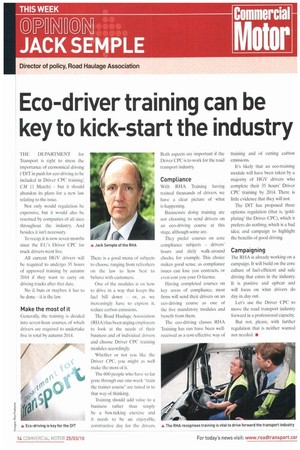Eco-driver training can be key to kick-start the industry
Page 14

If you've noticed an error in this article please click here to report it so we can fix it.
-111E DEPARTMENT for Transport is right to stress the importance of economical driving ('DfT in push for eco-driving to be included in Driver CPC training', CM 11 March) but it should abandon its plans for a new law relating to the issue.
Not only would regulation be expensive, but it would also he resented by companies of all sizes throughout the industry. And besides, it isn't necessary.
To recap. it is now seven months since the EU's Driver CPC for truck drivers went live.
All current HGV drivers will be required to undergo 35 hours of approved training by autumn 2014 if they want to carry on driving trucks after that date.
No if, buts or maybes: it has to be done it is the law.
Make the most of it Generally, the training is divided into seven-hour courses, of which drivers are required to undertake five in total by autumn 2014.
There is a good menu of subjects to choose, ranging from refreshers on the law to how best to behave with customers.
One of the modules is on how to drive in a way that keeps the fuel bill down or, as we increasingly have to express it, reduce carbon emissions.
The Road Haulage Association (RHA) has been urging employers to look at the needs of their business and of individual drivers and choose Driver CPC training modules accordingly.
Whether or not you like the Driver CPC, you might as well make the most of it.
The 600 people who have so far gone through our one-week "train the trainer course" are tuned in to that way of thinking.
Training should add value to a business rather than simply be a box-ticking exercise and it needs to be an enjoyable. constructive day for the drivers. Both aspects are important if the Driver CPC is to work for the road transport industry
Compliance
With RHA Training having trained thousands of drivers, we have a clear picture of what is happening.
Businesses doing training are not choosing to send drivers on an eco-driving course at this stage. although some are.
They prefer courses on core compliance subjects drivers' hours and daily walk-around checks, for example. This choice makes good sense, as compliance issues can lose you contracts, or even cost you your 0-licence.
Having completed courses on key areas of compliance, most firms will send their drivers on an eco-driving course as one of the live mandatory modules and benefit from them.
The eco-driving classes RHA Training has run have been wellreceive(' as a cost-effective way of training and of cutting carbon emissions.
It's likely that an eco-training module will have been taken by a majority of HCiV drivers who complete their 35 hours' Driver CPC training by 2014. There is little evidence that they will not.
The DIT has proposed three options: regulation (that is, 'goldplating' the Driver CPC), which it prefers: do nothing, which is a had idea; and campaign to highlight the benefits of good driving.
Campaigning
the RHA is already working on a campaign. It will build on the core culture of fuel-efficient and safe driving that exists in the industry. It is positive and upbeat and will focus on what drivers do day in, day out.
Let's use the Driver CPC to move the road transport industry forward in a professional capacity.
But not, please. with further regulation that is neither wanted nor needed. •




































































































































